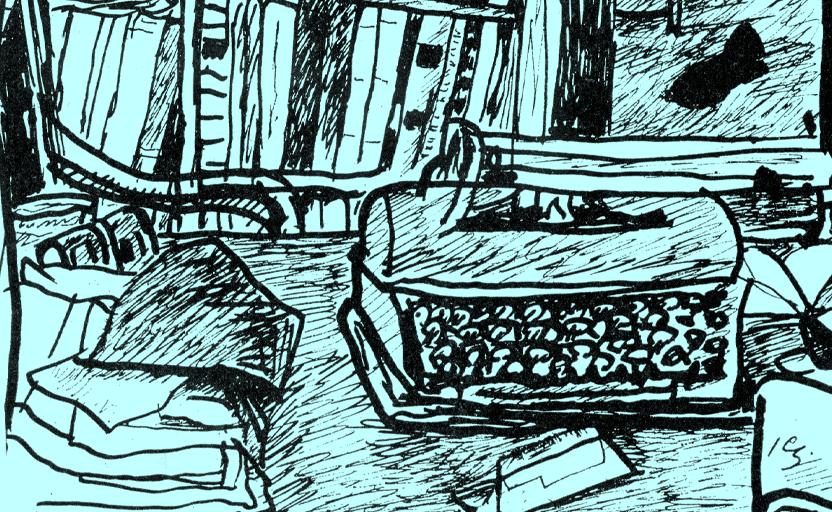
In the Archives of the Literary Institute
The first stage in the creation of a new inventory for the archival collections at Maisons-Laffitte is nearing completion. On 15 January 2016 the Association Institut Littéraire Kultura was furnished with an index for over of 60 thousand individual items. Among those present at the ceremony were Magdelena Gawin, deputy minister of Culture and National Heritage, Tomasz Makowski, director of the National Library and Władysław Stępniak, director of the National Archives.
“This is a very important threshhold for all those connected with the project which has been seven years in the making. The Ministry of Culture and National Heritage will always be open to such projects and will lend its support in a variety of ways, resources permitting” – stated Magdalena Gawin.
The Literary Institute also received a number of letters including one from the Chancellery of the President of the Republic of Poland, and the following letter from prof. Piotr Kłoczowski:
Dear Mr Chairman,
Dear Wojtek,
I am delighted to hear that a modern archival system at the Instytut Literacki is now nearing completion. To a substantial degree this is to the credit of the National Library specifically its director Tomasz Makowski and the team he created led by Maria Wrede, as also to the director of the National Archives Władysław Stępniak and to Andrzej Biernat.
At this juncture it is appropriate to extend thanks also to director Jacek Miler, who from the outset had a clear understanding of the assignment and gave it his full support.
All Ministers of Culture since 1989 have been actively engaged with Maisons-Laffitte.
I remember our conversations soon after Jerzy Giedroyc’s death, during which we concluded that we would not wish the Institute to become a museum or memorial. The idea of creating a contemporary archival facility came at the outset of our exchanges, a facility given over to the intellectual, political and literary history of Poland in the divided Europe of the “Postwar” – to quote the title of the well known book by Tony Judt.
In those initial exchanges, we all understood that the Literary Institute and “Kultura” should redefine their role and place on the map not only of Poland, but also of post-war European history. What indeed was this remarkable think-tank to the divided Europe, what was it to the Polish intelligentsia, to the democratic opposition, to Poland as a whole?
The Literary Institute’s modern archives will allow such questions to be asked and answers proposed, they will offer new horizons to those seeking understanding and conducting research.
As we know, the study of the past is never a closed subject – the reading of the historical record and its interpretation change with the passage of time.
I am convinced that in terms of history, intellectual enquiry and research – all is still before us.
In a celebrated article he wrote for “Le Débat” Konstanty Jeleński referred to Maisons-Laffitte as “Poland in Exile”. This was indeed an ideal Poland in exile, embodying from the outset the qualities of a free, liberal, pluralistic, tolerant Republic, running against the grain of the habits, prejudices and resentments of the past. This was an exiled Poland open to le pays réel and le pays légal, open to the Poland as it existed in the reality of a divided Europe. It was also open to the captive nations of the Ukraine, Lithuania and Byelorussia, open to Russia, to Germany, to the whole of Europe. Here was a Republic embodying from the outset intellectual, literary, political and historical standards of discourse of the highest calibre. This Poland in exile remains for us a peerless exemplar – today and probably for always. This is our mythical Sèvres prototype, now enhanced by its modern archives, open to researchers and their new questions, with its horizons ever open.
Dear Wojtek,
As we have known each other for years since those early Kraków days and cooperated ever since, allow me to say how much I recognize and admire the efforts which you and your small, remarkable team have expended not only save, but also to re-establish the Literary Institute.
When Jerzy Giedroyć was dying, this was by no means a foregone conclusion.
Your achievement calls for toasting with a good whisky – always at hand when Giedroyc was with us.
Please accept my cordial salutations to you, your team and your esteemed guests at today’s ceremony.
Piotr Kłoczowski
We too extend our thanks to the remarkable group of archivists from the National Library and the National Archives who have worked so splendidly and with such dedication under the able leadership of Maria Wrede for the past seven years.
You can read more about this project on the web pages of the National Library of Poland, and also inter alia in the pages of "Polityka".